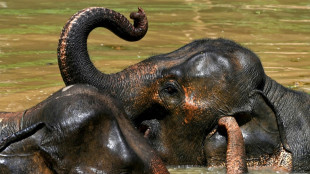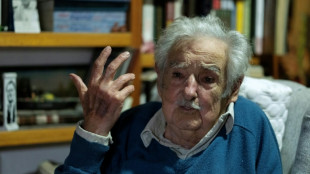-
 Icelanders head to the polls after government collapse
Icelanders head to the polls after government collapse
-
England strike twice to have New Zealand in trouble in first Test

-
 Researchers analyse DNA from dung to save Laos elephants
Researchers analyse DNA from dung to save Laos elephants
-
North Korea's Kim, Russian minister agree to boost military ties

-
 Brook's 171 gives England commanding 151-run lead over New Zealand
Brook's 171 gives England commanding 151-run lead over New Zealand
-
Kamala's coda: What's next for defeated US VP Harris?

-
 Chiefs hold off Raiders to clinch NFL playoff berth
Chiefs hold off Raiders to clinch NFL playoff berth
-
Australia's Hazlewood out of 2nd India Test

-
 Trudeau in Florida to meet Trump as tariff threats loom
Trudeau in Florida to meet Trump as tariff threats loom
-
Jihadists, allies breach Syria's second city in lightning assault

-
 Trudeau in Florida to meet Trump as tariff threats loom: media
Trudeau in Florida to meet Trump as tariff threats loom: media
-
Hunter shines as Hawks top Cavs again

-
 Southampton denied shock Brighton win by dubious VAR call
Southampton denied shock Brighton win by dubious VAR call
-
Alarm over high rate of HIV infections among young women, girls

-
 Swiss unveil Euro 2025 mascot Maddli
Swiss unveil Euro 2025 mascot Maddli
-
Bears fire coach Eberflus after latest agonizing NFL defeat

-
 Rallies mark one month since Spain's catastrophic floods
Rallies mark one month since Spain's catastrophic floods
-
Arnault family's Paris FC takeover completed

-
 Georgian police stage new crackdown on pro-EU protestors
Georgian police stage new crackdown on pro-EU protestors
-
'We're messing up:' Uruguay icon Mujica on strongman rule in Latin America

-
 Liverpool dealt Konate injury blow
Liverpool dealt Konate injury blow
-
Van Nistelrooy appointed Leicester manager

-
 Verstappen brought back to earth in Doha after F1 title party
Verstappen brought back to earth in Doha after F1 title party
-
Global wine output to hit lowest level since 1961

-
 Norris boosts McLaren title hopes with sprint pole
Norris boosts McLaren title hopes with sprint pole
-
Big-hitting Stubbs takes satisfaction from grinding out Test century

-
 Romania recounts presidential ballots as parliamentary vote looms
Romania recounts presidential ballots as parliamentary vote looms
-
French skipper Dalin leads as Vendee Globe passes Cape of Good Hope

-
 Chelsea not in Premier League title race, says Maresca
Chelsea not in Premier League title race, says Maresca
-
Brazil's Bolsonaro aims to ride Trump wave back to office: WSJ

-
 France requests transfer of death row convict held in Indonesia: minister
France requests transfer of death row convict held in Indonesia: minister
-
'Mamie Charge': Migrants find safe haven in Frenchwoman's garage

-
 Iconic Uruguayan ex-leader hails country's swing left as 'farewell gift'
Iconic Uruguayan ex-leader hails country's swing left as 'farewell gift'
-
Thousands rally in Georgia after violent police crackdown on pro-EU protesters

-
 Shared experiences make Murray 'perfect coach', says Djokovic
Shared experiences make Murray 'perfect coach', says Djokovic
-
Iran, Europeans to keep talking as tensions ratchet up

-
 Inflation-wary US consumers flock to 'Black Friday' deals
Inflation-wary US consumers flock to 'Black Friday' deals
-
France shows off restored Notre Dame after 'impossible' restoration

-
 South African bowlers strike after Sri Lanka set big target
South African bowlers strike after Sri Lanka set big target
-
Namibia reopens polls after election chaos in ruling party test

-
 Georgia police arrest dozens in clashes with pro-EU protesters
Georgia police arrest dozens in clashes with pro-EU protesters
-
US stocks rise on Black Friday

-
 Leclerc on top for Ferrari in Qatar GP practice
Leclerc on top for Ferrari in Qatar GP practice
-
Jihadists, allies enter Syria's second city in lightning assault

-
 Amorim puts faith in Mount to turn around Man Utd career
Amorim puts faith in Mount to turn around Man Utd career
-
Guardiola will not 'run' from Man City rebuild

-
 Assisted dying campaigners, opponents rally at UK parliament
Assisted dying campaigners, opponents rally at UK parliament
-
Durable prop Healy set to carve name in Irish rugby history

-
 Macron unveils Notre Dame after 'impossible' restoration
Macron unveils Notre Dame after 'impossible' restoration
-
Traumatised Spain marks one month since catastrophic floods

EU discusses deportation hubs to stem migration
EU countries on Thursday discussed "innovative" ways to increase deportations of irregular migrants and rejected asylum seekers, including controversial plans to set up dedicated return centres outside the bloc.
Far-right gains in several European countries have helped put migration issues atop the agenda as home affairs ministers from the bloc's 27 states meet in Luxembourg ahead of a gathering of EU leaders later this month.
Brussels said that ministers would consider whether the bloc should explore the "feasibility of innovative solutions in the field of returns, notably the return hub concept".
"We must not rule out any solution a priori", France's new Interior Minister Bruno Retailleau said as he arrived for the meeting.
The talks come only a few months after the European Union adopted a sweeping reform of its asylum policies.
The long-negotiated package, which will come into force in June 2026, hardens border procedures and requires countries to take in asylum seekers from "frontline" states or provide money and resources.
But more than half of the EU's member countries have said it does not go far enough.
In May, 15 of them urged the European Commission to "think outside the box", calling for the creation of centres outside the EU, where rejected asylum seekers could be sent pending deportation -- the plan to be discussed on Thursday.
"Pressure is on accelerating deportations," Jacob Kirkegaard, an analyst at Brussels-based think tank Bruegel, told AFP.
A growing number of governments are eager to show they are trying to "get rejected migrants off the streets one way or another", he added.
- 'Hotspots' -
There are no detailed plans of how return hubs could work in practice.
A diplomatic source said one potential option entailed asking EU membership candidates -- over which the bloc holds some leverage to ensure acceptable standards -- to host such centres.
But sending migrants to third countries is fraught with ethical and legal questions -- something that might stop the idea from ever becoming reality.
Another diplomatic source cautioned that legal and fundamental rights assessments were needed to verify the feasibility of any such project.
Last year, less than 20 percent of the almost 500,000 people who were ordered to leave the bloc were effectively returned to their country of origin, according to Eurostat, the EU statistical office.
Repatriations are notoriously difficult -- they are costly and require the cooperation of the countries migrants need returning to.
According to border agency Frontex, the top three nationalities of migrants who irregularly crossed into the EU so far this year are Syria, Mali and Afghanistan -- countries with which Brussels has no or at best difficult relations.
Besides return hubs, Austria and the Netherlands have suggested legal changes to allow for the sanctioning of rejected asylum applicants who are ordered to leave but fail to do so -- something that experts say could pave the way for detentions.
On Thursday, Belgium's secretary of state for asylum and migration Nicole de Moor described the return system as "the weakest link" in the chain, adding it needed to be revised to allow for faster deportations.
She was echoed by Germany's interior minister Nancy Faeser who said reform had to go hand in hand with "possible agreements" with third countries, also to potentially process asylum applications there.
But finding a "partner state" for any potential return hubs was "the most difficult point to resolve in practice," Faeser added, speaking to reporters as she arrived at the talks.
Some point at a deal Italy has struck with Albania to hold and process migrants there as a possible way forward.
But other agreements the EU sealed with Tunisia, Libya and others providing aid and investments in return for help with curbing arrivals have proved hugely contentious and have faced legal challenges for exposing migrants to mistreatment.
- 'Political show' -
Sophie Pornschlegel, of Europe Jacques Delors, another Brussels think tank, said capitals were keen on putting up a "political show, because of the enormous pressure from far-right parties".
Often riding anti-immigrant sentiment, hard-right parties performed strongly in June European elections, and have come out top in recent national and regional votes in the Netherlands, Austria and Germany.
France's government tilted to the right after a snap vote this summer, and Retailleau is known for his hardline stance on migration.
Irregular border crossings fell by 39 percent to almost 140,000 in the first eight months of 2024, compared to the same period last year, according to Frontex.
EU countries plus Norway and Switzerland received 85,000 asylum applications in May, down by a third compared to a peak reached last autumn, according to the European Union Agency for Asylum.
K.Thomson--BTB
